Climate danger grows in ‘vulnerable’ Myanmar after military coup
Fears that military could step up exploitation of resources to shore up finances, putting one of the world’s most climate-vulnerable nations at increased risk.
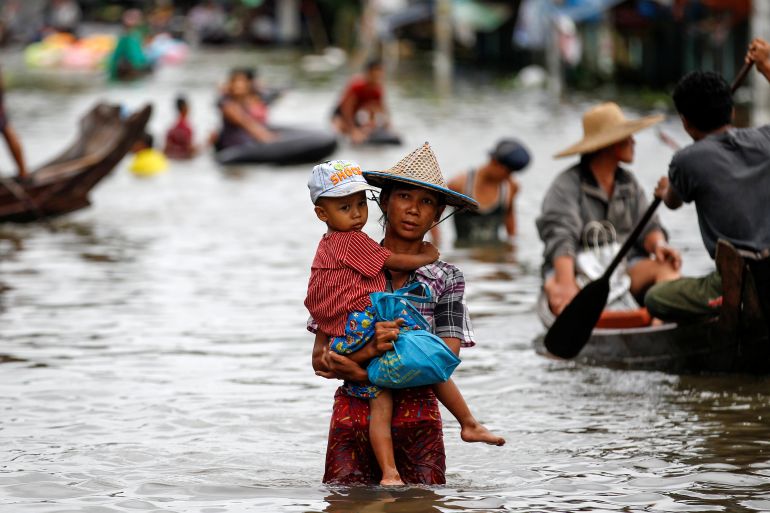
Yangon/Taipei – There is increasing concern that Myanmar is at risk of a serious environmental crisis, as the generals who seized power in a coup on February 1 focus on cementing their control and shoring up their position by stepping up lucrative but devastating policies of exploiting the country’s vast natural wealth.
The Global Climate Risk Index puts Myanmar among the countries most at risk from the climate crisis, frequently experiencing devastating floods and landslides as well as drought, exacerbated by decades of uncontrolled deforestation and mining of minerals and gems.
Keep reading
list of 4 itemsMyanmar students boycott classes following school reopening
Infographic: What has your country pledged at COP26?
What’s in the Glasgow Climate Pact?
Over the past 20 years, the Southeast Asian country has experienced the highest weather-related losses alongside Puerto Rico and Haiti.
But tentative efforts to pursue more renewable energy projects and develop climate resilience under Aung San Suu Kyi’s government have been derailed since the military overthrew her National League for Democracy’s elected administration on February 1, suspending aid programmes and leading to the departure of private investors.
Developers who were awarded a solar power tender last year — totalling more than 1GW or one-third of Myanmar’s current dry season available capacity of 3.1GW — were unable to deliver, partly because of the coup.
The military in May launched its own solar power tender but was forced to extend the bidding deadline three times due to a lack of bidders. The latest deadline passed in mid-October but no official results have been announced to date.
Difficulties facing solar power companies mirror the broader risk of Myanmar missing out on climate finance opportunities post-coup.
“There are good investable projects in Myanmar which would build climate resilience such as natural reforestation and renewable energy projects,” said Vicky Bowman, director of Yangon-based Myanmar Centre for Responsible Business and former British ambassador to Myanmar. “But development partners seem frozen since the coup, and private sector investors instinctively now view Myanmar as high risk and look to alternatives in Southeast Asia, even though climate investments there may have as many problems in practice as Myanmar.”
Investors should see that there are still opportunities to work with local communities and companies to invest in natural capital and climate resilience, Bowman told Al Jazeera. “Otherwise the Myanmar people are hit with a double whammy of military rule and international neglect.”
Myanmar’s absence from the world’s top climate negotiations at COP26 in Glasgow last month reflected the country’s coup-induced international isolation, and the ongoing battle for recognition between the coup leaders and the National Unity Government (NUG), the parallel administration including officials from the elected government that was overthrown.
Isolation
COP26 hosts, the UK, left Armed Forces Chief Min Aung Hlaing off the summit guestlist, while the event organisers, the UN Framework Convention on Climate Change (UNFCCC), disinvited Myanmar military government representatives, according to two sources involved in the matter.
Chit Win, the military-appointed chief diplomat in London who had evicted the removed government’s ambassador from the embassy after the February 1 coup, did manage to register temporarily on the event page with three associates. But they were denied entry and were subsequently taken off the system following a backlash from people in Myanmar.
Al Jazeera has seen copies of both nationally determined contributions (NDCs) — climate action plans and policy commitments — submitted by the NUG and the State Administration Council, as the coup leaders have dubbed their ruling body.
Both NDCs estimate the business-as-usual (BAU) scenario for coal to be about 30 percent of the country’s total power generation, which was what the NLD deputy energy minister Tun Naing reaffirmed in 2019.
The NUG claimed that they plan to decrease the share of coal from 33 percent (about 7940MW) to between 20 percent (3620MW) and 11 percent (2120MW) by 2030. The SAC gave the same figures.
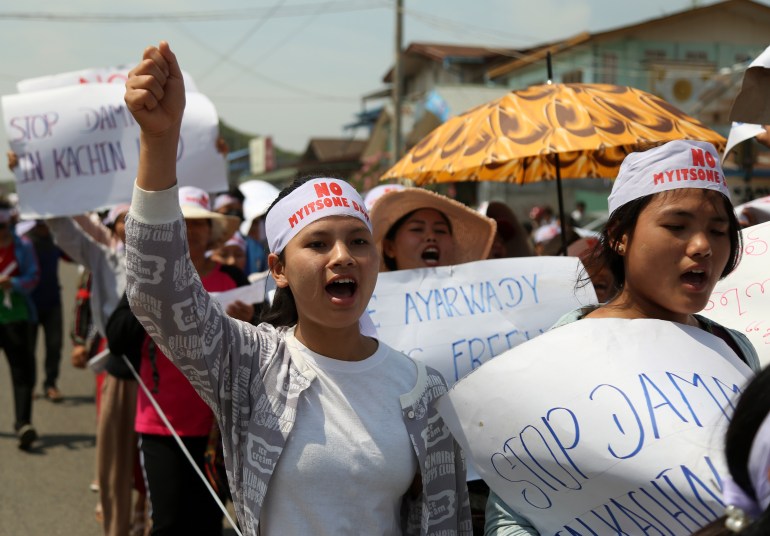
But coal’s share of power generation is currently less than 1 percent, 30 times less than the higher-end estimates provided by the NUG and SAC. Sources attributed the discrepancy to efforts by some producers to encourage Myanmar to use more coal.
“The NLD government’s deputy minister [Tun Naing] at the time was being egged on by Japanese, Chinese and Indian coal interests, which no longer would be interested both for policy reasons and because it’s Myanmar post-coup,” an industry source in Yangon told Al Jazeera.
The NUG said it stuck with the overthrown NLD administration’s NDC for COP26 because they felt it had legitimacy from being drawn up by the government elected by the people, according to two senior officials at the NUG’s Ministry of Natural Resources and Environmental Conservation who requested anonymity due to security reasons.
“Considering the legitimacy provided by the Myanmar people to the ousted administration, we [NUG] submitted the NLD government’s NDC to COP26,” said a senior official at the NUG’s Ministry of Natural Resources and Environmental Conservation.
Another senior NUG official said that there had not been enough time for them to redraft the NDC.
“We have received some comments from Indigenous groups and will take their input into account as we revise the NDC,” the official said when asked about the role of ethnic communities in protecting forests.
NUG Deputy Electricity and Energy Minister Maw Htun Aung acknowledged the criticisms and said that the coal policy would be “reconsidered” and the energy master plan reviewed, although it is currently the SAC rather than the NUG which is in the capital, Naypyidaw.
“It does not make sense to focus on coal power. Even China is phasing out coal financing. We do not plan to scale up coal projects, and will work with ethnic communities to draft an energy policy on a federal level,” Maw Htun Aung told Al Jazeera.
According to government estimates last year, electricity in Myanmar comes from 20 gas-fired power stations, 62 hydropower facilities and a single coal-fired plant.
Resource exploitation
In addition to the slowdown in climate-related action and investments, environmental activists and analysts fear that the military will scale up logging, the teak trade, palm oil plantations and the exploitation of natural resources, such as jade, which supported the long-term survival of previous military regimes even under international sanctions.
The generals have also long profited from gem sales, and local media report a gem fair is due to take place in Naypyidaw this month.
Military-appointed agriculture minister Tin Htut Oo in November spoke about expanding palm oil plantations, according to the state-run Global New Light of Myanmar. The official paper said “implementations are underway” to make Tanintharyi Region, a major region in southern Myanmar bordering the Andaman Sea and Thailand, “a big oil pot based on palm oil”.
Mary Callahan, a Myanmar expert at the University of Washington in the United States, says the proposal is “disastrous for fragile ecosystems and endangered species”. Promoting palm oil plantations could lead to a new wave of land confiscation and more deforestation, she told Al Jazeera.
Weeks after seizing power and detaining Aung San Suu Kyi and her allies, Min Aung Hlaing also talked about developing hydropower dams.
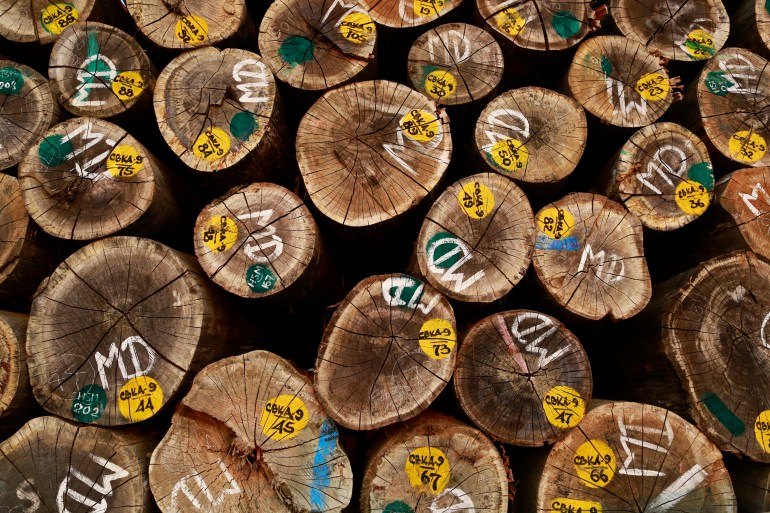
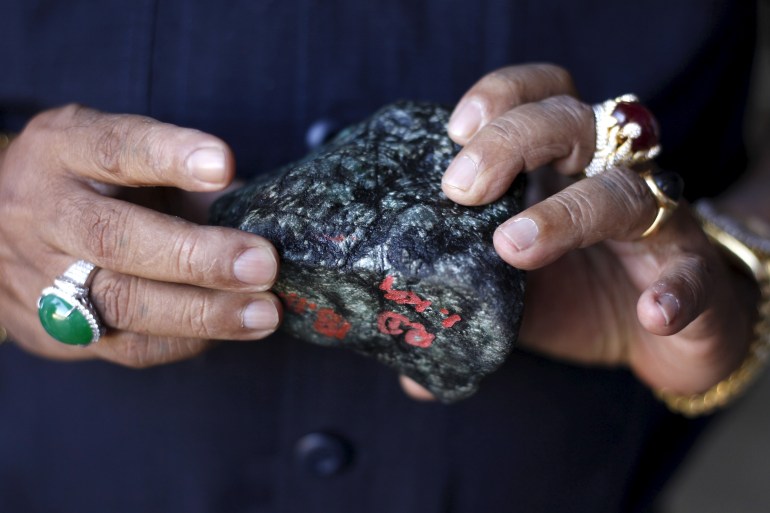
This has sparked fears that the military might decide to restart the controversial China-backed Myitsone Dam in northern Myanmar, a pet project of former strongman Than Shwe that was halted by then-president Thein Sein in 2011 in the face of significant public protests. The generals have not mentioned Myitsone directly.
“We are very concerned that the military will fall back on old policies like large-scale hydropower, which could spell disaster for the country’s two major rivers – the Ayeyarwady and Thanlwin – the last two remaining large free-flowing rivers in tropical Asia,” said a senior staff member at an environmental NGO working on Myanmar, who declined to be named for security reasons.
Ethnic communities along the borders, coasts and hilly regions are also concerned about the climate risks.
“Of course we are worried about climate change. We are working on forest management and climate issues,” said a senior official of an ethnic armed group in northern Myanmar, who declined to be identified due to the sensitivity of the matter. Even though most of the territories controlled by his group are mountainous and protected from flooding, other climate-induced disasters such as cyclones, drought and landslides remain a threat to the local population. Since the coup, his group, which has long sought autonomy, has renewed fighting against the armed forces.
“Because of the coup and political crisis, it has become more difficult to address environmental challenges. For one, more and more international investors and partners have withdrawn from Burma,” he said. A key reason, he added, is that “the Burmese military leader will rely on natural resources to resolve their finances problem. Not only this junta but also successive regimes in the previous State Peace and Development Council [SPDC] era.”
The SPDC was the official name for the military government that seized power in 1988.
“Forests in the border areas controlled by ethnic groups are more secure than those in government-held regions,” the staff member from the environmental NGO said. “To help protect these forests, we need neighbouring countries and economic blocs like ASEAN and the EU to be on high alert for illegally-traded timber. Tackling demand is key.”
Still, in his written remarks submitted to COP26, the military-appointed Natural Resources and Environmental Conservation Minister Khin Maung Yi pledged to achieve 50 percent net emissions reductions by 2030 “if adequate international assistance is received”.
“Similarly, by 2030, the share of new renewable energy targets (solar, wind) will be increased from 2000MW to 3070MW,” Khin Maung Yi wrote.
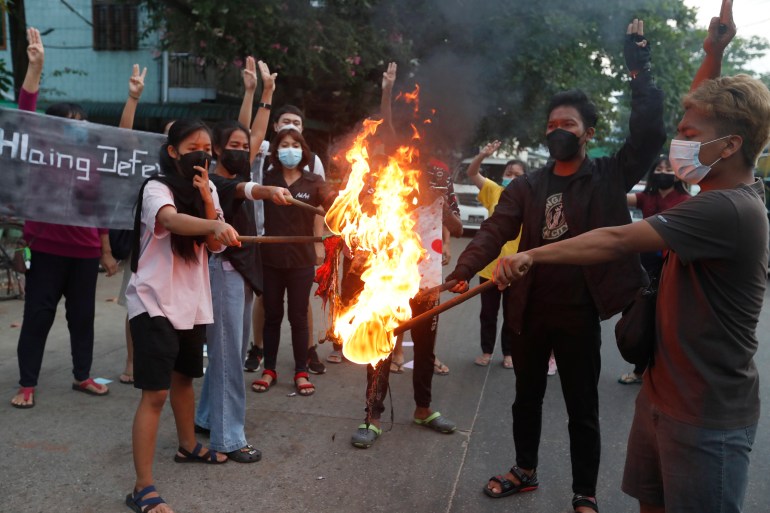
But as long as the political crisis continues its downward spiral, neither the foreign assistance nor the energy investments on which the military is banking — with the possible exception of China — is likely to be forthcoming, according to diplomats and investors in Yangon.
Experts say environmental exploitation risks pushing more into poverty and increasing food insecurity, but as the generals focus on crushing any resistance to their rule, few have any confidence they will have the will to address Myanmar’s impending climate nightmare.